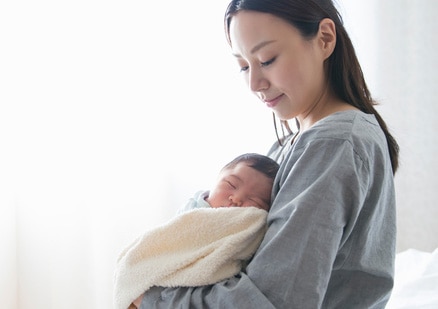During your stay

In our Labor and Delivery Unit, you’ll stay in a private room with a private bathroom and shower, a flat-screen TV, free Wi-Fi, and phone. There will also be a rocking chair and a bed for your partner or support person. One adult support person may stay with you throughout your hospital stay.
Your nurse will help you get comfortable caring for your newborn, and support you through umbilical cord care, diapering, bathing, swaddling, and breastfeeding or chestfeeding.
Meals and snacks
Meals and snacks are provided during your stay — order healthy food from a menu anytime between 7 a.m – 7 p.m. Meals featuring local produce are made to order by our chefs and delivered to your room. Your support person is also welcome to order meals for a fee. Instructions on how guests can pay for their meals are on the menu.
Rooming in
Research shows that babies who stay in the same room as their parents adjust better, and new parents rest and recover better. We encourage you to have baby with you as much as possible during your hospital stay. It helps with bonding and learning to recognize baby’s needs.
Hand-washing
As your new baby’s immune system develops, hand-washing is an important way to prevent infection. Protect your newborn by asking visitors to wash their hands before touching your baby. If anyone is sick — even mildly — ask them not to visit until they are feeling better.
Newborn security
Your baby’s security is important to us. Never leave your baby unattended. If you need to be away from your baby for any reason, let your nurse know so we can make sure your little one is safely cared for.
You, your baby, and your partner will receive matching wrist bands after baby is born. A wireless radio frequency band will be placed on your baby’s ankle to make sure they remain in the baby unit, which is also equipped with security cameras.
Your baby will stay with you in your room unless there is a medical reason for your newborn to be in the NICU.
All Kaiser Permanente employees wear badges with their name, title, and photograph. Hospital employees with privileges to care for newborns have a yellow identification badge. Only allow staff with this yellow badge to take your baby from your room for any reason.
If you’re ever uncomfortable with the person who is asking to take your baby from you, use your nurse call button to ask for an additional staff member to confirm the request.
Newborn screenings
All newborns undergo painless cardiac and hearing screening tests. The hearing test is performed by a newborn hearing screening technician and the cardiac test, which looks at your baby’s heart health, will be performed by your nurse. These tests will be done in the postpartum unit before you go home.
Chestfeeding
Human milk is nature’s perfect first food, and chestfeeding can enhance the bond between you and your baby. The American Academy of Pediatrics recommends exclusive chestfeeding for 6 months and continued chestfeeding through the first year of life. Learn more about chestfeeding
Support for successful breastfeeding:
- We encourage skin-to-skin contact, which triggers healthy baby behaviors. It helps your little one stay warm on their own, breathe on their own, and learn to nurse.
- All of our labor and delivery and postpartum nurses are trained chestfeeding specialists. We also have a team of internationally board-certified lactation consultants at our hospitals and outpatient chestfeeding clinics.
- Every parent and newborn baby will be scheduled to see a lactation consultant within a few days of going home from the hospital This visit is an opportunity to feed your baby with the lactation consultant there to help, get tips about chestfeeding, pumping, and/or bottle feeding. There will also be an opportunity to weigh and examine your baby and ask any questions you may have about newborn care.
- Our chestfeeding support group will help you learn about chestfeeding positions, milk supply, preventing and managing pain, pumping, milk storage, and working while chestfeeding.
Leaving the hospital
After delivery, you’ll be seen daily by a midwife or obstetrician. They will care for you during recovery and help determine when you’re ready to go home. The length of your hospital stay will depend on a variety of factors.
If you have a vaginal birth, you may be ready to go home when your baby is one day old. If you have a cesarean birth, you may need to stay one or two days longer.
You’ll be given a ‘pathway home’ tool in your room which lists all the things that need to happen before you’re discharged. On the day you leave the hospital, we’ll try to complete the discharge process in the morning so you can get home and settled in for that first night on your own with baby.
Secure checkout
When you’re ready to leave, your support person should bring the car up to the front of the hospital. A staff member will wheel you and your baby downstairs after you’ve gone through our secure checkout.
Car seat
Oregon and Washington law requires that you take your baby home in a car seat. Our staff is not licensed to assist or direct you with car seat usage or installation. We encourage you to take an Infant Safety and CPR program before baby is born. It also helps to have your car seat installed a few weeks before baby is due.
Car seat installation resources
Always read and follow the car seat instructions, as well as your vehicle seat belt instructions. You can find guidelines for safe car seat installation online. You can also call 1-866-SEAT-CHECK (1-866-732-8243), or go to seatcheck.org to find a seat-inspection location certified by the National Transportation Safety Board.